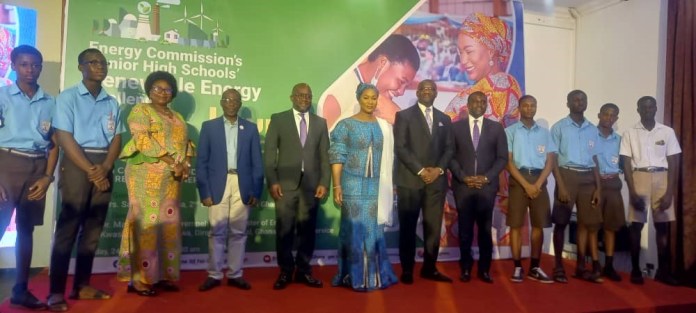Energy Commission, in collaboration with the Ghana Education Service (GES), has launched the 3rd edition of the Energy Commission’s Senior High Schools’ Renewable Energy Challenge (ECSHSREC) with a focus on ‘Clean Cooking and Food Processing using Renewable Energy Technologies’.
The challenge seeks to promote creative thinking and provide mentorship to students in the second-cycle institutions, and also extend to them the platform to exhibit their innovative projects.
The competition, which is open to all senior high schools, expects participating students to develop projects in the area of either clean cooking or food processing, and these should be related to the use of renewable energy technologies.
In the area of clean cooking, the focus is to be on either improved stoves or fuels, while for food processing, schools should focus on how renewable energy could be utilised in food processing and preservation.
Speaking at the launch in Accra, Second Lady, Samira Bawumia, who doubles as a Global Ambassador for the Clean Cooking Alliance, suggested that the innovative ideas and solutions developed by the students should be further advanced by the country’s research institutions and the renewable energy industry to be used for commercial purposes.
She added that the efforts will lead to producing not only brilliant students but also future scientists who will help develop the nation and economy.
“Solid biomass constitutes the bulk of domestic fuel sources for over 70 percent of Ghanaian households; specifically, 35 percent rely on firewood, while 34.6 percent rely on charcoal. Liquified Petroleum Gas (LPG) is also used by 25.8 percent of Ghanaian households. Rural dwellers in Ghana still rely mainly on firewood for their domestic and productive cooking activities. The effects and impact on the use of these solid biomass fuels, together with inefficient cookstoves cannot be over-emphasised,” she noted.
Using unclean cooking solutions and fuels can lead to non-communicable diseases such as stroke, heart-related diseases, Chronic Obstructive Pulmonary Disease (COPD), and lung cancer.
Moving from exam passing to innovation
Executive Secretary of the Energy Commission, Oscar Amonoo-Neizer, also entreated that schools, teachers and students be supported by all to enable them to give off their best in developing concepts and ideas. He stressed the need to view science education beyond passing exams.
“It is therefore vital that we move our second cycle education from an era where science education is conceived to be only for students passing an examination, to the development of ideas and projects that will aid in solving everyday challenges in the country.
“Participating schools are encouraged to come up with new product innovations, accessories to products, or digital innovations to improve the performance or efficiency of existing projects in the above-mentioned areas. The projects to be submitted should aid individuals or businesses in the residential, commercial, or industrial sectors of the clean cooking value chain,” he said.
Support
For his part, the Deputy Energy Minister, Andrew Kofi Egyapa Mercer, pledged the ministry’s support for this initiative.
He reiterated the policy goal of the ministry, which is to achieve the distribution of 3 million units of clean and efficient biomass cookstoves and 50 percent LGP use by 2030, adding that the SHS Renewable Energy Challenge will enhance its efforts at achieving it.
“The Ministry of Energy intends to fund the further development and promotion of the most outstanding innovative clean cooking solution from this year’s school challenge for further development and promotion,” he said.
The Challenge was born out of the commission’s mandate under the Renewable Energy Act, 2011 (Act 832), which includes the promotion of the development and utilisation of renewable energy resources. The commission is also to recommend and advise relevant stakeholders on the educational curriculum on efficient use of renewable energy sources and evolve programmes for its mainstreaming in the educational curriculum in Ghana.










